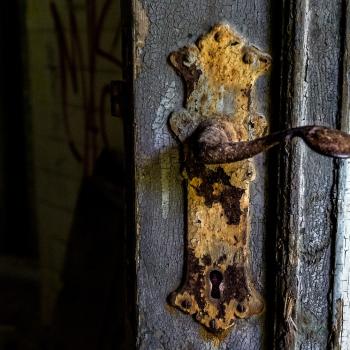Although I haven’t been able to write a whole lot on this site lately, I am just DELIGHTED to continue to point you to different voices whose thoughts are changing the world. Today’s writer, Katey Hage, is no exception. I relish her thoughts on listening to and learning from the next generation and can’t wait for you to dive into them too. Proceeds from today’s post go toward RAICES.
—

I live down the street from an indigenous cultural community center called DayBreak Star. It is a community hub for urban native Americans, a resourcing and educational center, and they run a small, intentionally multicultural preschool. Recently, several Black Lives Matter signs were defaced near the center. Within a day, the preschool decided to do something about it. With the help of their teachers, preschoolers made signs and marched down the street to show solidarity in the fight against racial injustice. Compelled by the injustice of the moment they used their creativity, voices, and bodies, for the movement – proudly declaring “Black Lives Matter!”
A few days later, my family joined in the Seattle Children’s March which was organized and led by a group of young Black students who are tired of the anti-blackness, police brutality and systemic racism they experience daily in the school system and our city. Supported by parents, teachers, and grassroots organizers, they planned an educational rally, a protest with clear and strong demands, and a post-march celebration of Black lives. These young people owned the stage, held the mic, and put one foot in front of the other leading thousands of protestors with confidence and boldness, loudly chanting, “Black culture, Black skin, more than a trend!”
The youth have my attention.
If we look back, young people throughout history have demonstrated an inner strength and sense of justice to rise up and speak out. The Children’s Crusade in Birmingham, Alabama, May 1963. Youth Day, Soweto Uprising in South Africa, June 1976. Tiananmen Square protests in Beijing, Chine, June 1989. Young people led the movements that brought about civil rights laws, rights to vote, and rights to free speech.
While adults today may be waiting for the next generation to grow up, the youth in our midst are waiting for adults to hear them, see them, and believe in their ability to enact justice in this world.
What do we see?
Mari Copeny, @LittleMissFlint, a youth climate activist from Flint, Michigan has been using her voice to bring awareness to the Flint water crisis since she was 8 years old.
We know the name of youth climate activist Greta Thunberg. What about Vanessa Nakate, 23, Founder of Africa-based The Rise Up Movement; Zeena Abdulkarim, 18, organizer at Zero Hour; Isra Hirsi, 16, co-founder of the Youth Climate Strike; Jerome Foster II, 17, Founder of OneMillionOfUs, or Vic J. Barrett, 21, youth plaintiff in Juliana v. United States?
Even March For Our Lives, the youth-led organization to end gun violence has displayed an ability to acknowledge intersectionality of race, power and privilege and create a structure that holds space for diverse leadership, specifically decentering white youth leadership.
I am convinced that when children–whose history and bodies carry the weight of oppressive systems of injustice–are given the language of race as a social construct; that knowledge empowers them to resist, disrupt, and reclaim their identity. This knowledge gives them voice and agency amidst systems that are against them. For [white] children who experience privilege in a racialized society, awareness of how race is socially constructed has the power to bring a new cultural awareness to that child’s future behaviors and relationships. Engaging in empathetic listening, learning a more complex story of history, following leadership of Black, Indigenous and people of color, deconstructing the patterns that uphold white privilege, and learning how to live in anti-racist ways– are all forms of transformation and growth that young white people, and children from all backgrounds, can participate in.
I have been in children and family ministry for twenty years. Most of my career has been spent in multi-ethnic and multicultural children’s ministry. The young people I serve today are writing letters to government officials, participating in protests, staging walk outs at their schools, raising money for global and local organizations that work with marginalized communities. These kids have a sense of justice and compassion that is rooted in their faith, their cultural identity and their conviction that all people are made in the image of God.
How does this happen? Ibram X. Kendi lays it out simply in his new book called Anti-Racist Baby– an “anti-racist baby is bred not born.” I believe that a child’s spiritual identity grows up inside of their cultural, racial, and ethnic identity. Just like all identity that develops over time, a child’s faith becomes rooted and connected by first being malleable and flexible, in a child full of curiosity and wonder. As a Jesus follower, I believe that every child needs to hear, that they are made in the image of God, and are created for community and belonging in Christ. As image bearers of God, we can affirm their wholeness, worth, and dignity–that God made them on purpose as they are–body, mind, and spirit. Their bodies, stories, and life experiences matter to God. I believe that every child should know that belonging in the family of God is an experience of life transformation; of continually being reconciled with God and people. As beliefs take root, they guide a child’s heart and actions in following the ways of God’s love and justice for self and others.
In the same way that we see young people putting their passion, conviction and sense of justice in action–how is the Church putting our beliefs about children and young people into action? How are we showing up to support children and youth? In what ways are we sharing the table, passing the mic, and listening to “the next generation”? How can we honor the legacy of the generations that have come before, tell the stories of those who have paved the way, and invite young people to discover their place in the movement of God, and the movement in our nation for justice? Iris Chen creator of the parenting website, Untigering writes, “when we empower our children to listen to their inner compass and are willing to follow their lead, they truly become the prophets and thinkers of our generation.” I have hope in this moment– because I see the strength, creativity, and resilience of young people. As children and youth learn stories of the courageous leaders who came before them, they are inspired to act.
What happens when we do not listen?
I am keenly aware that the majority of young people today do not see the church as the place to enact racial justice and to address systemic oppression. While many young activists today may have roots in the church, often they have had to leave the church to find their voice and their place. Can we imagine for a moment, youth who are raised from a young age to understand that God made a diverse and multicultural world on purpose, that the differences in our bodies, our ways of thinking, our cultural expressions are good and beautiful? Can we imagine what might happen if they see the interconnectedness of their faith, race and cultural identity? Can we imagine what it looks like to acknowledge a child’s agency, power, and voice even while they are young – that helps them become adults who see the dignity and fullness of humanity in others, because they themselves have experienced and lived into the fullness of their own worth and value? Can we imagine churches full of young people–listening, learning, honoring elders, leading, dancing, singing, preaching, teaching, marching, praying, mentoring, and engaging as whole and active participants?
God grant us the imagination to see what you see, and hear what you hear in our young people today.
—
 Rev. Katey Hage has over 20 years of experience in children and family ministry in the Pacific Northwest, serving as pastor, coach, and consultant. For the past 17 years, she has served on staff at Quest Church in Seattle where she has helped build an intergenerational, all-abilities, and multicultural children and family ministry. She is passionate about teaching kids and families how the intersections of cultural identity, faith, and race are necessary parts of spiritual formation and our pursuit of God’s justice. Wife and mom of three, Katey enjoys being near water, collecting vitamin D from the sun, reading books, writing, and amateur painting.
Rev. Katey Hage has over 20 years of experience in children and family ministry in the Pacific Northwest, serving as pastor, coach, and consultant. For the past 17 years, she has served on staff at Quest Church in Seattle where she has helped build an intergenerational, all-abilities, and multicultural children and family ministry. She is passionate about teaching kids and families how the intersections of cultural identity, faith, and race are necessary parts of spiritual formation and our pursuit of God’s justice. Wife and mom of three, Katey enjoys being near water, collecting vitamin D from the sun, reading books, writing, and amateur painting.
*Post contains Amazon Affiliate links












